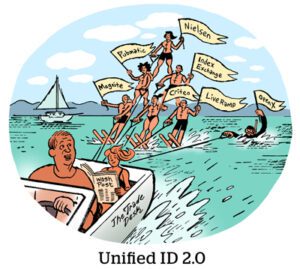Here’s today’s AdExchanger.com news round-up… Want it by email? Sign up here.
WWD-See It To Believe It
Ad tech is on tenterhooks waiting for privacy-related news from Apple’s upcoming Worldwide Developers Conference next week. Sandwiched between glitzy announcements about shiny new products and hardware, many expect a momentous mention as to whether Apple will start hiding IP addresses on iOS or hold off for another year.
But regardless of what happens, Apple’s IP address drama will not be the biggest news coming out of WWDC, according to tech blogger Robert Scoble.
Scoble predicts Apple will introduce an entirely new OS with augmented and virtual reality capabilities, followed shortly thereafter by the release of headsets, devices and displays to support this new, well … what’s the word Meta uses to describe it? Oh, right, metaverse.
Apple and Meta’s coldish war over mobile advertising will then heat up into a true one-on-one contest to be the go-to VR OS.
Scoble’s tweet thread is long but worth it. Fifteen tweets in, he drops this nugget: “Oh, and a new search engine is coming too. Will Siri finally get ‘smart’? Hmmm.”
If Apple has a search engine ready for primetime, it could quickly leapfrog Bing to become Google’s main contender. Currently, Google shells out boatloads – somewhere between $15 billion and $20 billion last year, according to experts – to be the default search engine on Apple devices.
Minderoo’s Keeperoos
Google worked out revenue-sharing deals with 24 independent Australian publications represented by the Minderoo Foundation, a philanthropic group founded by Aussie businessman Andrew “Twiggy” Forrest and his wife Nicola, the Sydney Morning Herald reports.
Google will also provide additional funding to special interest outlets, including Time Out, The Greek Herald, The Australian Jewish News and Australian Chinese Daily. The deals are for undisclosed amounts paid to the publishers in exchange for using their news content in Google search results.
With these latest agreements, Google has now brokered more than 60 commercial deals covering over 180 Australian media outlets.
The deals were struck in response to Australian legislation that stipulates Big Tech platforms must compensate qualified news publishers for using their content in search results and news feeds.
Google’s agreements with publishers shine an unflattering light on Meta, which has yet to enter any similar deals.
Neither Google nor Meta has been “designated” under Australia’s news media bargaining law. (The Australian Treasurer has the power to designate which digital platforms are subject to the code.)
But Google’s voluntary efforts to negotiate with publishers should keep it on the good side of regulators, according to the Sydney Herald, whereas Meta may need to be designated in order to compel compliance with the law’s revenue-sharing provisions.
Going Somewhere?
Chase bank will launch a new consumer travel portal as part of its ambitions in the travel industry, Skift reports.
The news of Chase’s growth in travel and hospitality may not seem directly relevant to the world of data-driven marketing – but it is.
For one, travel and credit card companies have become strategic acquirers of marketing analytics providers. Mastercard purchased SessionM in 2019 and turned the CDP tech into its loyalty program.
Mastercard also acquired Dynamic Yield from McDonald’s earlier this year, and Capital One invested in Hopper, a travel-booking app with strong programmatic chops. Capital One used Hopper to revamp its travel site.
On the flip side, Marriott is looking to attract marketing budgets via a new ad network business based on its Bonvoy loyalty program.
Word to the wise: Keep an ear out for mentions of the term “loyalty program,” which is now a precursor to the launch of advertising and attribution platforms. Travel and credit card companies have an opportunity to sync loyalty programs for the purposes of stronger customer acquisition.
But Wait, There’s More!
The nuances between “thick” and “thin” platforms. [Stratechery]
RevenueCat’s Jens-Fabian Goetzmann: Why product managers should not be data driven. [blog]
The tech titans of Silicon Valley are in serious trouble – and may take the market down with them. [Insider]
Brian Morrissey: Morning Brew’s creator focus. [blog]
You’re Hired!
WPP shop Grey names Jonathan Lee as its chief strategy and data officer. [Ad Age]
















